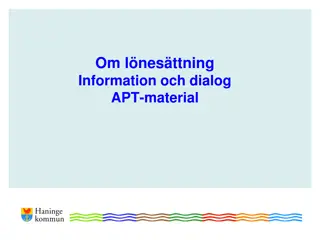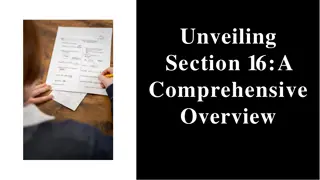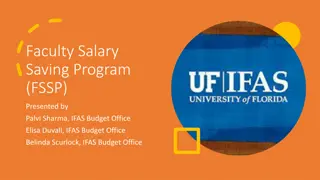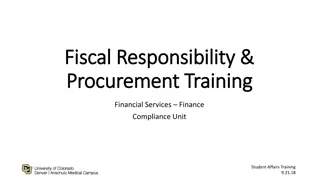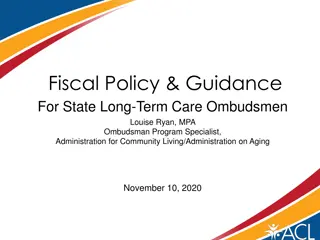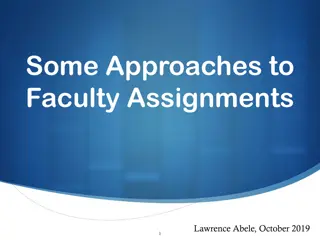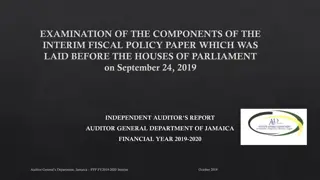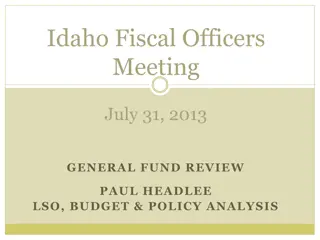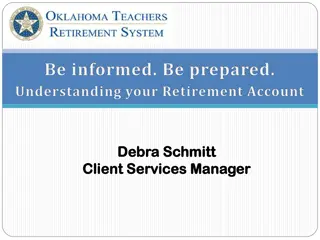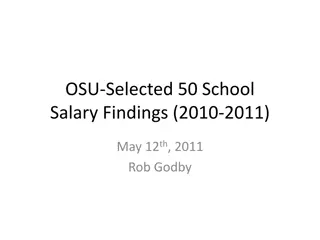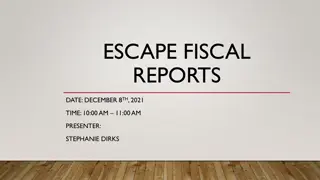Salary Cycle Training and Course Objectives for Departmental Fiscal Officers
The training, presented by the CAL Financial Advisory Board, focuses on salary cycle management, reconciliation, and budgeting for Departmental Fiscal Officers. The course objectives include understanding salary lines, data entry, reconciliations, and communication with stakeholders. Expectations involve creating encumbrance tools, tracking commitments, and reducing year-end adjustments. Classes cover budget building, salary reconciliation, corrections, and projections. Access requests for EBS and Planning & Budget tools are also outlined.
Download Presentation

Please find below an Image/Link to download the presentation.
The content on the website is provided AS IS for your information and personal use only. It may not be sold, licensed, or shared on other websites without obtaining consent from the author.If you encounter any issues during the download, it is possible that the publisher has removed the file from their server.
You are allowed to download the files provided on this website for personal or commercial use, subject to the condition that they are used lawfully. All files are the property of their respective owners.
The content on the website is provided AS IS for your information and personal use only. It may not be sold, licensed, or shared on other websites without obtaining consent from the author.
E N D
Presentation Transcript
SALARY CYCLE TRAINING PRESENTED BY CAL FINANCIAL ADVISORY BOARD (FAB): MICHELE BURTON, KEN DESLOOVER, CARLY ENSIGN, SUZIE REED
COHORT 2: DEGREE GRANTING DEPARTMENTAL FISCAL OFFICERS VIKI GIETZEL, JOY FRANKS, ANGELA HUNT, SHERRY STEVENS, MARILYN DUKE Round Table Introductions Your unit Your involvement with salaries Have you used the budget or raise tool Do you keep an up-to-date salary book If not, how do you reconcile salaries
COURSE OBJECTIVES Understand unit salary lines Confirm and enter data into Planning Analytics/Budget Tool Confirm and enter data into the Raise Tool Reconcile salaries monthly for each account Make corrections to salaries if necessary Ideally there should not be salary savings or overages, aside from unplanned leaves or unknown grants Anticipate salary adjustments Communicate with Stakeholders
COURSE EXPECTATIONS Have an understanding of salary commitments Create a salary encumbrance tool Track paid and encumbered salaries Accurately budget salaries for FY20 Track course load exceptions Fewer salary correction/year-end adjustments (salary savings)
CLASSES Budget Building Building your salary reconciliation tool- working meeting, July 16, 2019 Linton 120 Raises Salary Reconciliation (logged/tracked like monthly ledgers) Corrections/Cost Redistributions Projections (under/over) Working in Planning Analytics: Unit Budget Planning Working in Planning Analytics: Faculty Raise Tool
ACCESS REQUESTS Log into EBS and check access to: Planning & Budget tile Unit Budget & Faculty Raise 02 and 01 All FOs should have access to all of CAL s Unit Budget BI Administrative Assistant Folder
ACCESS REQUESTS Planning & Budget tile Google: MSU earms click Generic at the bottom of the list Next search by last name Add Next In the first box under Description of request access type this: ADD: Cognos Planning View & Submit- BP-GF & RP for10004000 and all orgs within this MAU Business Need: New FO to Unit
ACCESS REQUESTS Administrative Assistant Folder Google: MSU earms click Generic at the bottom of the list Next search by last name Add Next In the first box under Description of request access type this: ADD: BI-AAR-University Business Need: Purpose: New FO to unit. Need to provide salary and appointment data to Administrators. Data may be exported to excel to manipulate (rearrange/reorganize) and share with Administrators. Data will not be modified locally.
CLASS 1: BUDGET BUILDING Where do you get the information to build your salary books? Stakeholder(s) Reports Business Intelligence Administrative Assistant- Current Salary Roster HR Payroll- Labor Distribution Report, Salary Encumbrance Report Query Studio Salary Comparison Report Other
CLASS 1: BUDGET BUILDING What information is missing from your salary book that would be helpful? What information is difficult to find? Do any of the columns not apply to your unit? Do you include Graduate Assistants in your salary book? Do you include students and TOC in your salary book? What additional columns/information do you include in your salary book?
CLASS 1: BUDGET BUILDING Identifying Core Faculty and Staff Continuing vs. Fixed Term vs. Tenure System vs. Academic Specialists Continuing appointment status assures that the faculty member will not be dismissed due to capricious action nor will dismissal be used as a restraint of academic freedom or other civil rights Tenure System (also referred to as Tenure Stream faculty. These appointments are always continuing) Academic Specialists can be continuing or fixed term AS Appointment types: Academic Advising, Teaching, Curriculum Development, Research, Service/Outreach
CLASS 1: BUDGET BUILDING Identifying Core Faculty and Staff (continued) Continuing vs. Fixed Term vs. Tenure System vs. Academic Specialists (continued) Fixed Term faculty are neither Tenure System nor Continuing. They are end-date positions FT Faculty are appointed with a rank of instructor, assistant professor, associate professor Instructors have Master s Degree Assistant Professor and Associate Professors have a PhD FT Academic Staff are appointed as specialist, research associate, senior research associate, librarian, lecturer, and assistant instructor Lecturers and Assistant Instructors have a Bachelor Degree
CLASS 1: BUDGET BUILDING Identifying Core Faculty and Staff (continued) Recurring vs. Non-recurring- refers to budgets, not people Academic Year vs. 12 month Annual Year vs. Semester by Semester Annual Year AY- Most faculty are hired for the Academic Year. August 16-May 15. Paid 9 months out of 12 months 12 month AN- Most Faculty administrators. August 16-August 15. Paid 12 months Semester by semester AN- Some Fixed Term faculty. Appointment dates can vary. Pay depends on time appointed.
CLASS 1: BUDGET BUILDING Core Faculty and Staff would typically be: Continuing Non-End dated, or *guaranteed* renewal Non-TOC
CLASS 1: BUDGET BUILDING Identify and Define FTE (Full Time Equivalent) Committed FTE- % of employment at MSU Capacity Utilization- % of employment on Unit account Identify assignments/course loads Typical TS load is 2/2 (teaching 2 courses in the fall, 2 in the spring) Typical FT load is 3/3 (teaching 3 courses in the fall, 3 in the spring)
CLASS 1: BUDGET BUILDING Exceptions to standard 2/2 or 3/3 course load Leaves Sabbatical-TS only. Every 6 year maximum. Full calendar year or academic year at half pay (LHP) or half year or semester at full pay (LFP) Bi-yearly application process. Must be approved by the College. Prestigious/Fellowships- case by case basis FMLA (Family Medical Leave Act) Consultantship-TS faculty may serve their final year before retirement on a terminal consultantship basis, involving at least a half-time assignment. Research/Teaching-A release from teaching to pursue research to support reappointment Often offered to new TS faculty to use in their first 3-4 years Not formally documented by HR (or Dean s Office, that I know of)
CLASS 1: BUDGET BUILDING Course Buy-outs and Course Releases Although related, they are not the same thing and should not be used interchangeably Buy-outs: externally-funded salary support to temporarily shift duties from teaching Example: Professor Natalie Philips, in English, received a large grant, part of which pays for some of her salary. Since she needs to focus on the grant, she is released from teaching 1 course. The salary savings in English will be used to replace Professor Philips in the classroom. Course Release: permission to not teach 1-4 courses due to other duties. Example: As Philosophy Department Chair, Matt McKeon, only teaches1 PHL course per year. He has been released from teaching the other 3 due to his administrative duties. His classes may still need to be covered by another FAS- this is the opposite of salary savings.
CLASS 1: BUDGET BUILDING Accounts that may have salary lines General Fund (GF) These include GA (Operational) accounts Fringes (MSU s portion of health care, taxes, etc.) are not charged to GF accounts Grant (Restricted- RC/RG) Endowments/Gift (Restricted- RN/RT) Auxiliary (X) Designated (Unrestricted/self-supporting/income- DN, DS)
CLASS 1: BUDGET BUILDING Faculty Appointments Non-continuing/Fixed Term FAS need to be reappointed regularly, unless an exception has been approved, such as a waiver or Designation B. Faculty Reappointments must be entered in SAP and to HR by first week in May to be guaranteed in the next Fiscal Year s Budget Load. Appointments approved by HR after June 26 will likely have to be manually entered into the Budget Load. The goal is to have all salary lines accounted for before the Budget Tool closes in July.
CLASS 1: BUDGET BUILDING Next class: Salary Book Working Meeting Day/time: July 16 11-12:30 Faculty Raises- Cohort 1 & 2 Day/Time: August 5 or later
DATES & DEADLINES July 12- FY19 2ndclose July 10- Budget & Planning Tool Opens Go through your employee allocations with a fine tooth comb. Look at every.single.person. July 15- Fiscal Officer Unit Budget Planning Training with OPB August 5 EOB- Unit Budget Submission Deadline to CAL August 5- Raise Tool Opens August 9- Eligible for Raise?" column marked as Yes or No in raise application August 16- Unit Raise data entered for College Review
THANK YOU! Questions Feedback Suggestions for future classes




